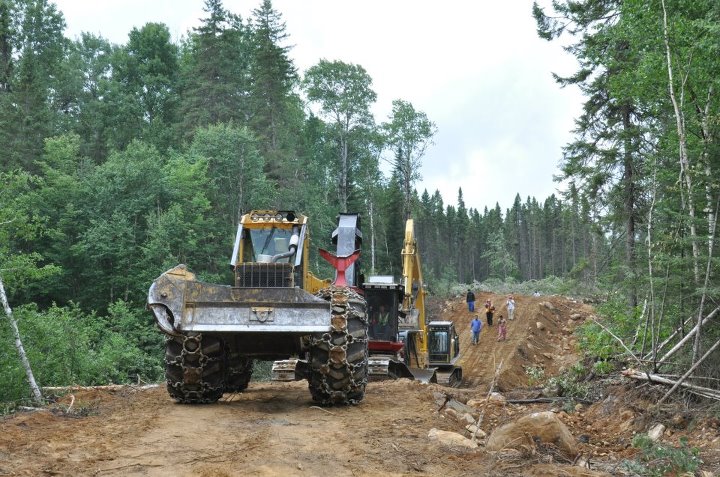|
August 1, 2012
 The Algonquins of Barriere Lake have
gained an unexpected victory in their decades-long struggle to secure their
land rights and protect areas of cultural, spiritual and biological
importance. The Algonquins of Barriere Lake have
gained an unexpected victory in their decades-long struggle to secure their
land rights and protect areas of cultural, spiritual and biological
importance.
After carrying out a series
of successful actions against Resolute Forest Products, the Quebec
government and forestry company agreed to respect a key portion of the 1991 Trilateral agreement,
a landmark sustainable development, conservation, and resource
co-management plan for some 10,000 square kilometers of the Algonquin’s
traditional territory.
Both Canada and Quebec have continuously refused to adhere
to agreement, which they co-signed with Barriere Lake 21 years ago. The
Algonquin community, in turn, has continuously protested and demanded that
both governments honor their word. Those protests have been routinely
confronted with the heavy hand of Quebec's police forces.
Now it appears the Quebec government is starting to change
its tune; though it's perhaps a little too early to be giving them any kind
of standing ovation. After all, the government was in the wrong and they
knew it. Even without the Trilateral agreement, the Province had a
constitutional obligation to work with First Nations in any decision that
could effect them - and it does not get to choose when and under what
circumstances it will do so.
That's the whole reason Barriere Lake started speaking out
in early July. Resolute Forest Products, the logging company formerly known
as AbitibiBowater Inc., had begun an illegal logging operation near Poigan
Bay, Quebec, in an area that holds sacred sites and an important moose
habitat. The Ministry of Natural Resources issued permits to Resolute
Forest Products without consulting or seeking the free, prior and informed
consent of Barriere Lake.
After the First Nation's initial
response, a number of protests and other actions were carried out,
including several successful stoppages of the company's operations, a
letter writing campaign, and powerful
demonstration outside the offices of Resolute Forest Products and
Premier Jean Charest in Montreal.
Media
coverage of the
situation was also
quite strong
throughout the month--a welcomed shift from the black hole that Barriere
Lake has been routinely trapped in for the past few years.
All of this came to a head with the Quebec Ministry of
Natural Resources agreeing to sit down with community representatives for
negotiations. The outcome of those negotiations was "a precarious but
important step in the community’s long struggle to pressure the Quebec and
Canadian governments to honour their landmark Trilateral Agreement, says
Barriere Lake Solidarity. Both the Quebec government and the forestry
company agreed to comply with the Trilateral Agreement's "measures to
harmonize".
In these measures, it is understood that logging companies
who wish to operate on Barriere Lake's land must not compromise the way
that the Algonquins use the land. In other words, "logging is not
allowed to happen where the community has hunting cabins, in areas of moose
and bear habitat, sacred areas, medicinal sites and many other areas of
concern to the community," adds Barriere Lake Solidarity.
It's an important step forward to say the least, but the
journey is far from over. Barriere Lake Solidarity goes on to say,
"Barriere Lake needs its supporters to remain vigilant to ensure
Resolute Forest Products respects the 'measures to harmonize.'"
"Even more importantly, we need to continue building
pressure on the Quebec and Canadian governments to finally implement the
Trilateral and Bilateral Agreements. The Charest government has been so
brazen in its disregard for the law and its contempt for Barriere Lake that
it has refused to honour the binding outcomes of negotiations conducted by two
former Liberal Cabinet Ministers! In 2006, a negotiator for the Quebec,
John Ciaccia, and a negotiator for Barriere Lake, Clifford Lincoln, issued
the recommendation that the agreement be implemented," Barriere Lake
Solidarity continues. "Quebec does not want to implement this
agreement because it sets precedents in giving Indigenous peoples control
over developments on their territories.
It's safe to say that Canada takes the same moral low
ground. Indeed, it would much rather turn First Nations into specialized
work farms for mining, logging and other industries. Sufficed to say,
Barriere Lake is far from alone in their struggle for permanence.
|


No comments:
Post a Comment
I have a few simple comment rules:
(a) No
1. rudeness
2. falsehood
3. deception
4. unfair tactics
5. comment spam
6. shilling or trolling
(b) stay on topic; and
(c) anonymous comments are okay, but sign with a handle so we'll know which "Anonymous" you are.
Thanks for commenting.
Ray